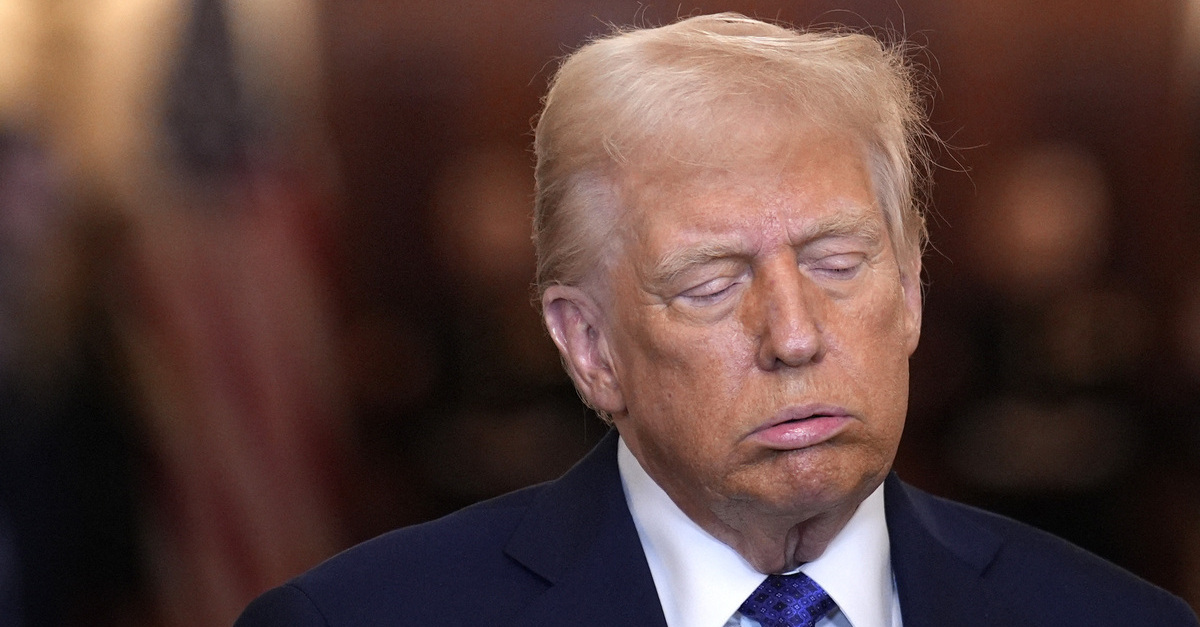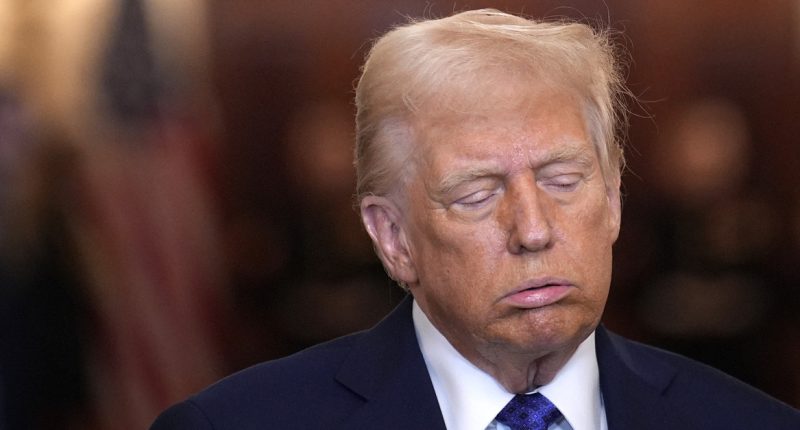
U.S. President Donald Trump arrives before signing the Laken Riley Act into law in the East Room at the White House in Washington, D.C., on Jan. 29, 2025 (Yuri Gripas/Abaca/Sipa USA/Sipa via AP Images).
The Trump administration has been ordered to cough up nearly $2 billion in foreign aid that it owes for existing contracts and grants formed by the U.S. Agency for International Development (USAID) and authorized by Congress, with a federal judge ruling Monday that it was unconstitutional of Trump to “unlawfully impound funds” earlier this year through a blanket freeze.
“The provision and administration of foreign aid has been a joint enterprise between our two political branches,” U.S. District Judge Amir H. Ali said in a 48-page opinion handed down in the District of Columbia. “That partnership is built not out of convenience, but of constitutional necessity,” Ali said. “This case involves a departure from that firmly established constitutional partnership.”
Organizations that entered into contracts or received grants from the State Department and USAID have been suing the Trump administration over an executive order that required a blanket freeze of all foreign aid funding. The coalition of foreign aid groups has argued that it was an unconstitutional exercise of presidential power “in contravention of congressional will” — as well as an “arbitrary and capricious agency action” — that will lead to starvation and the deaths of many.
Ali granted a temporary restraining order (TRO) on Feb. 13 that required Trump administration officials to dole out the $2 billion in aid and lift the funding freeze. An emergency stay, however, was placed on Ali’s order by U.S. Supreme Court Chief Justice John Roberts after a three-judge panel on the D.C. appellate court declined to take up the case and an appeal was filed with SCOTUS by Trump’s Justice Department. Ali ordered an emergency hearing to be held on Feb. 25 in response, during which he granted another TRO while he weighed judgment in the case. The Supreme Court wound up denying the DOJ’s appeal to lift the TRO on March 5, which brought things back down to the lower court.
On Tuesday, Ali issued his ruling and explained why he agreed with the foreign aid groups suing the Trump administration that it acted “in violation of the separation of powers” by freezing the flow of grant and contract money.
“As discussed, the violation here results from the Executive’s decision to unlawfully impound funds appropriated by Congress for specific foreign aid purposes,” Ali said. “The Executive has unilaterally deemed that funds Congress appropriated for foreign aid will not be spent. The Executive not only claims his constitutional authority to determine how to spend appropriated funds, but usurps Congress’s exclusive authority to dictate whether the funds should be spent in the first place. In advancing this position, Defendants offer an unbridled view of Executive power that the Supreme Court has consistently rejected — a view that flouts multiple statutes whose constitutionality is not in question.”
More from Law&Crime: ‘Cannot interject themselves’: Trump DOJ says states suing over president’s mass firings have no ‘legitimate claims’ and are doomed to fail in federal court
In a Supreme Court brief last week, Acting Solicitor General Sarah Harris said Ali’s Feb. 25 order was carried out at an “emergency hearing” where no additional evidence or briefings were presented. She claimed that this led to the Trump administration giving out “fraudulent” and “improper” payments without any proof that they were needed, with there even being alleged requests for funds related to “already-completed work.” Harris blasted the emergency TRO as a “pay-or-else order” that would be impossible to honor in such a short amount of time.
“Without asking for additional briefing or any evidence, the district court held an emergency hearing, granted that sweeping relief from the bench, and set a 36-hour clock for the government to ‘pay all invoices and letter of credit drawdown requests on all contracts for work completed prior to the entry of the Court’s TRO on February 13,”” Harris said. She claimed that there was no feasible way for the federal government to comply with the $2 billion demand in the way it’s been requested.
“The government cannot just press a button and disburse funds in response to any request that fits the district court’s description,” Harris said. “Instead, the government must undertake a multi-step process that complies with federal statutes before payments are authorized for disbursement.”
More from Law&Crime: ‘Choked out of its very existence’: Judge fears Trump will dismantle Consumer Financial Protection Bureau completely before she can stop him
Ali said in his order Tuesday that he agreed with the aid groups suing the Trump administration, which include the AIDS Vaccine Advocacy Coalition and Global Health Council, in saying that there was evidence of “immense irreparable harm to businesses and organizations across the country” as a result of the president’s blanket freeze, which has “at least to date, gone unrebutted” by the government, according to Ali and the groups.
“As the Court explained, this included immense financial harm to Plaintiffs and, in many cases, forced them to significantly cut down on staff or otherwise reduce core operations,” the judge explained. “As described above, in the roughly two weeks following the TRO, Defendants issued thousands of terminations, ultimately canceling roughly 9,900 of 13,100 USAID and State Department awards,” Ali said. “The Restrained Defendants are enjoined from unlawfully impounding congressionally appropriated foreign aid funds and shall make available for obligation the full amount of funds that Congress appropriated for foreign assistance programs.”
While Ali agreed that government officials should pay back what’s owed, he sided with the Trump DOJ and its argument that it should be allowed to move forward with legal efforts to reduce the amount of aid being given out moving forward.
“The Restrained Defendants shall take all steps necessary to effectuate this order and shall provide written notice of this order to all recipients of contracts, grants, and cooperative agreements for foreign assistance that were in existence between Jan. 20, 2025, and Feb. 13, 2025,” Ali said. “The parties shall file a joint status report by March 14, 2025, that apprises the Court of Defendants’ compliance with this order and proposes a schedule for next steps in this matter.”
Love true crime? Sign up for our newsletter, The Law&Crime Docket, to get the latest real-life crime stories delivered right to your inbox.





